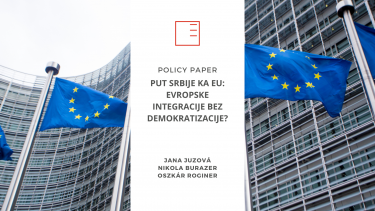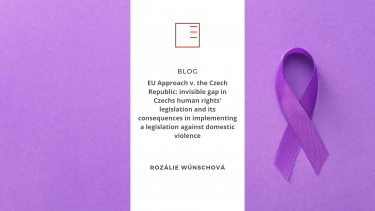Policy Paper | PUT SRBIJE KA EU: EVROPSKE INTEGRACIJE BEZ DEMOKRATIZACIJE?
Is Serbia succeeding in meeting the conditions for EU accession? Read the Policy Paper co-written by Jana Juzová, Nikola Burazer and Oszkár Roginer on Serbia's path to EU membership. The policy paper is written in Serbian.
Show more PDF
POLICY PAPER: Finding Transatlantic Unity in Times of Conflict 2022. Transatlantic Policy Forum in Review
Our researchers Danielle Piatkiewicz and Hugo Blewet-Mundy have written a policy paper on "Finding Transatlantic Unity in Times of Conflict 2022. Transatlantic Policy Forum in Review" which aims to outline action points and proposals that the Transatlantic Partnership should adopt.
Show more PDFPOLICY PAPER | QMV in CFSP: Impending necessity or resurfacing utopia?
Miroslava Pisklová writes about a discussion on potential broadening of the qualified majority voting (QMV) system to more of the remaining policy areas in the Council of the EU in which it is not yet used, namely the EU´s Common Foreign and Security Policy (CFSP) that has recently gained momentum. This publication aims to analyse the advantages and disadvantages of introduction of the QMV in CFSP of the EU with a focus on the potential impact on smaller member states.
Show morePOLICY PAPER | Shifting the gender quota debate from underrepresentation of women to overrepresentation of men within diplomacy
Ivana Uličná writes about the fact that even though some progress has been made towards gender equality in diplomacy, women remain underrepresented in ambassadorial positions worldwide. Quotas have been effective in boosting nominal representation of women but critiques focused on quotas being tokenistic and harming meritocracy place a double burden on women. However, even the current system is not meritocratic, as men benefit from a historical advantage and assumed competence, while women must justify their presence, prove their worth and disprove gender stereotypes.
Show moreBLOG: EU Approach v. the Czech Republic: invisible gap in Czechs human rights' legislation
Rozálie Wünschová writes in her blog that the Czech Republic is one of only two EU countries where corporal punishment of children is still legally permitted. Together with Slovakia, this puts the Czech Republic behind not only the Nordic countries, where corporal punishment was banned in the last century but also countries such as Turkmenistan, which adopted protective legislation in 2007.
Show more PDFiDNES: The EU will turn off your appliances. Lies about the Green Deal have taken over the internet in the Czech Republic
Our junior researcher Tatiana Mindeková conducted an analysis of the narratives around the Green Deal in the Czech and Slovak information scene. What kind of misinformation about the EU climate policy is being voiced in mainstream and alternative media? Tatiana Mindeková commented on the results of her research for iDNES.cz.
Show moreBLOG | European Media Freedom Act on the case of Slovenia: Has Slovenia overtaken the European Commission with its new law?
In September 2022, the European Commission put forward a proposal for a new media regulator - the European Media Freedom Act. Slovenia is one of the most struggling EU countries in terms of media freedom and independence. In the summer of 2020, the Janša government proposed a media-focused law that would increase the state's influence over Slovenia's national press agency and limit its funding of the public broadcaster RTV. Has Slovenia's new law put the European Commission ahead of the game? That is what our intern Klára Landová discusses in her blog.
Show moreSUMMARY OF EXPERIENCES WITH THE INVOLVEMENT OF CSOS IN V4 IN THE DECARBONISATION PROCESS
The project is focused on the examination of the role of non-governmental organizations in the process of decarbonization of coal regions in V4 countries (Czech Republic, Hungary, Poland, Slovakia). The aim of the project is to describe the best and worst practices of the individual processes for Serbia, who awaits the transformation of its energy mix, largely based on coal. The examined V4 countries have had a slightly different share of coal in their energy mix, while the largest one being in Poland and the second largest one in the Czech Republic, followed by Hungary and Slovakia. There are many similarities and differences in their takes on decarbonisation, thus providing different range of experiences.
Show more PDF

Report | Monitoring of the EU's Green Policies: Perceptions and Narratives in the Czech and Slovak Information Space
The European Green Deal is the core of the current climate strategy of the European Union, which has set the goal of making Europe a carbon-neutral continent by 2050. In an effort to monitor and counter disinformation narratives about the deal, IRI's Beacon project launched an initiative called the “European Green Deal: Mapping perceptions in Central and Eastern Europe,” in which six partner organizations studied how the deal is perceived in Bulgaria, Czechia, Poland, Romania, and Slovakia. Our project manager and juniour researcher, Tatiana Mindeková, analyzed narratives spread about the Green Deal and the EU’s green policies through Czech chain emails as well as through selected mainstream media and websites known for spreading disinformation.
Show more PDFPOLICY PAPER | EU Platform workers‘ directive: A test for regulating the future of work
A policy paper by our research intern Silke Maes entitled "EU Platform workers' directive: A test for regulating the future of work" takes a closer look at the aforementioned Directive on improving working conditions at work through platforms. The paper details the impact of the development of platforms on working conditions and then argues that the Directive is the first EU attempt to respond to this development.
Show moreStaroměstské náměstí 4/1
Prague 1 - Staré Město
110 00
tel.: +420 212 246 552
email: europeum@europeum.org
https://www.europeum.org









